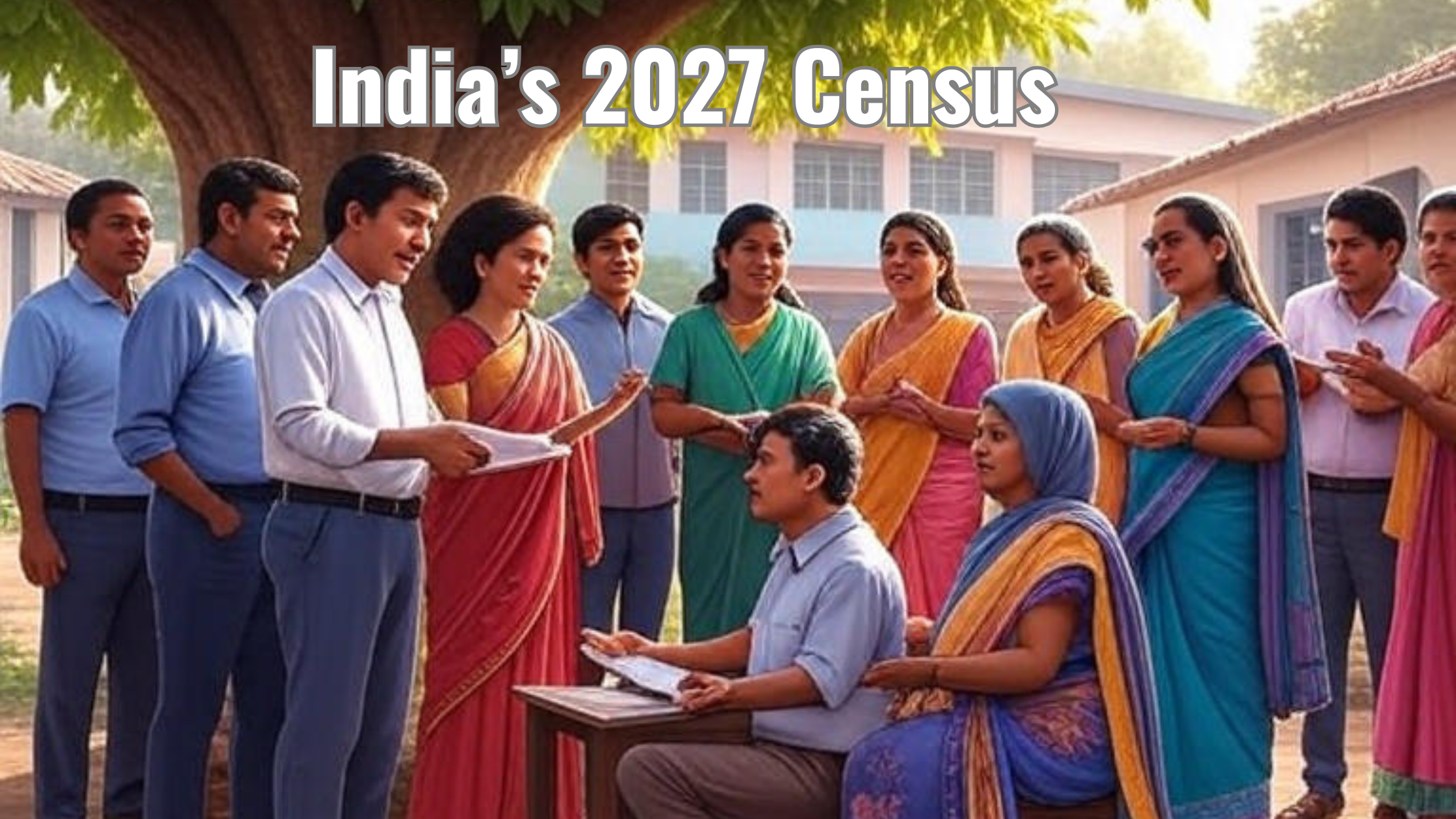India’s 2027 Census is far more than just a headcount.
This pivotal national exercise, delayed by the pandemic, is poised to trigger a political earthquake, fundamentally reshaping parliamentary power, social dynamics, and resource sharing across the nation.
Discover why India’s 2027 Census is the critical event that will redefine the country’s future for decades to come.
Table of Contents
What’s the difference between a “population” and a “people”?
A population is simply a group of people living in one place. A “people” is a political community, like “We the People” in India’s Constitution. This group shares rules for self-governance and resource sharing.
How does a census turn a population into a people?
A census counts people and labels them into categories (like caste, language, job type). This isn’t just counting – it shapes how we see ourselves as a nation. The 2027 Census is extra important because it will redraw India’s political map after delays from COVID-19.
What is a census, and what does it track?
A census records details about every person in India. Here’s what it covers:
| Word | Simple Meaning |
|---|---|
| Census | Official count of all people in a country, collecting data like age, job, and language. |
| Scheduled Castes (SCs) | Groups historically facing severe discrimination, listed in India’s Constitution for protection. |
| Scheduled Tribes (STs) | Indigenous communities with distinct cultures, also legally protected. |
| Demography | The study of populations: births, deaths, migration, etc. |
| Delimitation | Redrawing boundaries of political seats (like Parliament) based on population. |
Why is the 2027 Census tied to political power?
India must redistribute Parliament seats among states after the 2027 Census (as per Article 81 of the Constitution). This is called delimitation.
- Impact: States with fast population growth (like some in the North) gain more seats. States with slower growth but stronger economies (like some in the South) lose influence.
- Why it matters: Political power could shift from economically strong, aging regions to high-birth-rate, less-developed areas.
How does migration affect the census?
People move for jobs or to escape hardship. For example:
- Many moved from North/Central India to the South/West or Delhi.
- Impact: This changes regional populations, influencing which states get more/less political power after delimitation.
What’s new about counting castes in 2027?
For the first time since independence, all castes (not just SCs/STs) will be counted.
- Impact: This could increase demands to raise the 50% cap on job/reservation quotas. It might also reshape voting patterns around caste identities.
How are women’s rights and elections changing?
After delimitation:
- 1/3 of Parliament/Assembly seats will be reserved for women.
- The government wants simultaneous national/state elections.
- Impact: More women in leadership and streamlined elections – but this concentrates power.
How does money sharing between states fit in?
The 16th Finance Commission (starting 2026) decides how taxes are split between states and the central government.
- Impact: Its 2025 report will coincide with census results, affecting funds for states just as political power shifts. Some states feel shortchanged by current rules.
Why do political parties care so much?
- BJP: Could gain seats in high-growth states via delimitation. Pushing national identity over regional/caste divides.
- Congress/Left: Balancing regional demands with national unity.
- Impact: The census could boost the BJP’s vision of a unified India or deepen divides if caste/region tensions rise.
Final takeaway: Why is 2027 a turning point?
The 2027 Census will:
- Reshape political power via seat redistribution.
- Reveal caste dynamics for the first time in decades.
- Shift resources via Finance Commission rulings.
- Amplify women’s voices in government.
This “remakes the people” of India, not just counting us, but defining our future.
India’s 2027 Census is undeniably a landmark event, acting as the catalyst for profound political, social, and economic realignment.
Its outcomes will determine parliamentary seat distribution, redefine caste-based politics through a full enumeration, mandate significant women’s representation, and intersect crucially with national revenue sharing.
This census isn’t merely observing India; it’s actively remaking the political fabric of the nation for generations.
The choices made and data revealed will echo through every level of governance and society. India’s 2027 Census is where the future takes shape.
What’s your view? Should states with larger populations always get more political power, or should economic contributions matter too? Share your thoughts! 💬
FAQs- India’s 2027 census
- Q: Why is the 2027 Census so much more important than previous ones?
A: It triggers the first redistribution of parliamentary seats between states in over 50 years (delimitation), mandated by the Constitution. It’s also the first full caste census since independence and introduces major changes like women’s seat reservations. - Q: Which states might gain or lose political power because of this census?
A: States with higher recent population growth (often in the North/Central regions) are likely to gain more parliamentary seats. States with slower population growth but stronger economies (often in the South/West) risk losing political representation. - Q: What is the ‘caste census’ part, and why is it a big deal?
A: For the first time since independence, the census will count all castes, not just Scheduled Castes (SCs) and Scheduled Tribes (STs). This data could fuel demands to raise the 50% cap on reservations and significantly influence political strategies and social movements. - Q: How does the census connect to money and taxes (Finance Commission)?
A: The 16th Finance Commission’s recommendations (due late 2025) on how tax money is shared between the Centre and states will be implemented just as the 2027 Census results reshape political power. States losing seats might also fight harder for fairer revenue shares. - Q: When will we see the changes happen (like new seats or women’s quotas)?
A: Based on faster digital processing, the new parliamentary map (delimitation) could be ready for the 2029 general elections. Women’s reservation (33% seats) and potentially simultaneous elections are also linked to this delimitation process.


Leave a Comment